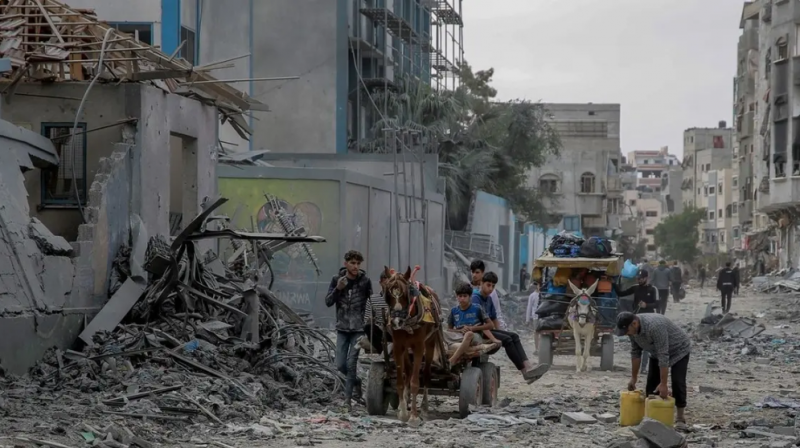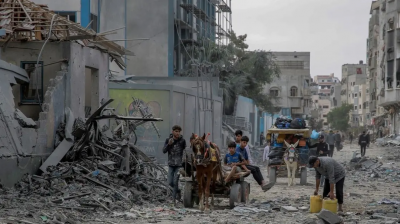Israeli Prime Minister Benjamin Netanyahu reaffirmed on Wednesday night that a specific question has been repeatedly raised in recent days. Netanyahu stated, according to Israeli media, that "in recent days I've been hearing a question: After exhausting the current phase of bringing back our captives, will Israel return to fighting?" He added, "My answer is definitely yes." He continued, "We can only return to fighting until the end. This is my policy and this is the policy supported by the entire cabinet." These remarks come despite increasing signs of a potential new extension of the truce that halted the fighting between Israel and Hamas since October 7.
Reports have mentioned a proposal for a "long-term truce" between the two sides that has been presented to mediators. Hamas leader Osama Hamdan confirmed that the resistance is ready to defend the Palestinian people against the aggression of the Israeli occupation. In an interview with Lebanese journalist Rawaad Daher on the program "Live," he stated that the occupation faces a significant "dilemma" on the ground and has been forced to acknowledge some of the losses it has suffered in its confrontation with the resistance.
He emphasized that the resistance's ability to endure is "high," stating: "We are a people who want our rights. If we can achieve them without fighting, that's good, but the Israeli does not even respect agreements, and the Palestinian has no choice but to resist." Hamdan added that the resistance still has many surprises in store and that it is too early to discuss them, mentioning that the confrontation might end without revealing all that it possesses.
Regarding talks of reaching a permanent ceasefire agreement, he noted that Qatar is making efforts in this direction, but he stressed it is premature to talk about this. Egypt is also participating in discussions with the United States in this context, and if the Israeli side obstructs these efforts, the situation on the ground will dictate outcomes.
Hamdan believes that the occupation still thinks with a "revenge mentality," but the realities on the ground do not support this perspective. He pointed out that the occupation's mechanisms have withdrawn from their positions, and they may be preparing for another scenario, as he described, affirming that the resistance is "ready to deal with all options."
He remarked that there should be a distinction between the moods of popular forces in Europe and the positions of governments that participate in legitimizing the aggression and have historically played a role in the establishment of the occupying state. On the issue of the exchange ratio of 10 Israeli prisoners for 30 Palestinian prisoners, he said this ratio pertains to civilian prisoners, but the equation for exchanging soldiers and officers is different, and he emphasized their insistence on securing the release of all prisoners from various judgments and organizations.
He stressed that one of the goals of Operation "Tsunami of Al-Aqsa" is to "restore the practical project for liberation and establish a sovereign Palestinian state." He added: "It pains us that a single Palestinian martyr dies; for me, every Palestinian is worth the entire Zionist entity, but liberation requires sacrifices." He considered that the steadfastness of the Palestinian people increases the "responsibility on the resistance to continue the path until liberation."
Commenting on news circulating about including the activist George Abdallah, imprisoned in French prisons, in the forthcoming deal, he said it is crucial to note that there are fighters who played a role in confronting the Zionist entity during the exchange process, such as prisoner George Abdallah, who remains imprisoned unjustly by the French authorities.
In response to discussions about Qatari and Egyptian communications with officials in the American and Israeli intelligence, the Hamas leader said that these meetings raise many ideas, and the final conclusion is that a basic premise of these ideas has begun to discuss the future of Gaza after the battle. He stated that the future of Gaza is a purely Palestinian affair, and they do not accept any outside interference.
Hamdan added: "Anyone who thinks the future of Gaza is separate from the contexts of Palestinian resistance is mistaken. President Mahmoud Abbas understands that any arrangements related to the Palestinian situation must be purely Palestinian." He emphasized their commitment to maintaining relations with Fatah but asserted that these relations should not come at the expense of the rights of the Palestinian people.
He revealed that Hamas proposed to mediators the release of elderly Israeli male prisoners, who are not military personnel, in exchange for the release of elderly prisoners in Israeli jails, but this was rejected. He concluded that the Palestinian people have pledged loyalty to all resistance leaders, from Sheikh Izz ad-Din al-Qassam, who came from Jabla in Syria, to the great revolution, and then the contemporary revolution led by Fatah and the Popular Front, and now the current resistance led by Hamas and Islamic Jihad, thus he feels confident about Hamas's popularity as long as it continues to resist.
Regarding Hamas's stance on Saudi Arabia, he stated that Saudi Arabia announced it would not normalize relations under these circumstances, which is an important position. He hopes it will not normalize because the occupation is the source of crises and disasters in the region.
He affirmed that "the Gaza battle revealed the truth of the Zionist project," and he added: "Would anyone accept to put their hand in that of the murderers? The true nature of the occupation desires further expansion and to drop a nuclear bomb on Gaza. Is there anyone willing to have a relationship with this entity?"
In response to the question, "Does Hamas regret the Tsunami of Al-Aqsa?" he stated: "Why do some assume we would retreat from our act of resistance? Do we regret breaking a complete battalion in the occupation army?" He added: "I promise an upcoming battle for liberation, and not just a new October 7. What took place in this battle confirmed that the future of the occupation entity in the region is not guaranteed."




